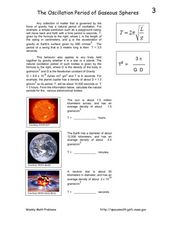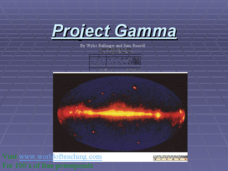Neutron Star Teacher Resources
Find Neutron Star lesson plans and worksheets
Showing 76 resources
Socratica
What Are Neutron Stars?
What happens at the end of the life cycle of a star? A lesson in the Socratica Astronomy playlist shows three ways a star dies: white dwarf, black hole, and neutron star. Each ending depends on the mass of the original star.
Crash Course
Neutron Stars
This is one heavy video! Introduce the topic of neutron stars with a brief but informative resource. Young astronomers discover the history of neutron star research, the conditions present in and around a neutron star, and the...
Kurzgesagt – In a Nutshell
Atoms As Big As Mountains—Neutron Stars Explained
What is the densest object in the universe? Neutron stars claim many unique properties—including the title of densest object—that are extreme, even for our universe. The video explains how neutron stars form and why it is important for...
TED-Ed
The Life Cycle of a Neutron Star
From supernova to neutron star ... what's next? A video presentation describes a neutron star and its life in the universe. Learners then answer questions online to asses their understanding.
Khan Academy
Supernova (Supernovae)
How does a massive star go supernova? This video is a follow up to the Kahn Academy video on the life cycle of massive stars and explains the chemical collapse that results in a supernova. Sal explains the process with neutron stars and...
Veritasium
Neutron Star Merger Gravitational Waves and Gamma Rays
Scientists have theorized about the merging of stars based on scientific theories and mathematical principles. For the first time, observation has confirmed these theories. Viewers share in the excitement of the discovery as they watch...
McGraw Hill
Neutron Stars Interactive
The universe is full of sources of energy. Explore the energy of pulsars with your classes through a simulation. An interactive lesson allows learners to manipulate the angle of rotation of both the earth and the pulsars. A real-time...
Crash Course
High Mass Stars
It's better to burn out than fade away! Viewers experience the birth of neutron stars and supernovae in a video that explains the life cycle of high mass stars. Learners see the conditions needed to produce these events, as well as...
Curated OER
Stars
In this space science worksheet, students use the clues to assist them in solving the crossword puzzle on the stars. They identify various constellations and how each rotates.
Curated OER
The Oscillation Period of Gaseous Spheres
In this oscillation period instructional activity, students read about how the force of gravity effects the oscillation of bodies. Students use two given formulas to identify the oscillation period of the sun, the Earth and a neutron star.
SciShow
Nuclear Pasta May Be the Strongest Material Ever
Do you ever feel like scientists have more fun naming new discoveries than actually finding them? Discover the fun they had while learning about the extremely scientific concepts of nuclear pasta, gnocchi, spaghetti, waffles,...
Curated OER
Timing An X-ray Pulsar
Young scholars use X-ray data to identify an object as a rotating neutron star, and determine its period of rotation. They use XTE observations of the Crab Pulsar to determine the period of the light intensity, interpret this period as...
Glynn County School System
Lives and Deaths of Stars
Star light, star bright ... just how long can you wish on that star? Well, it depends on its mass. The presentation explains the life cycle of stars based on their sizes. Scholars learn about the life expectancy of a star based on the...
Curated OER
Solid, Liquid, and Gas
Delve into the differences among solids, liquids, and gases with this PowerPoint. It is both applicable and attractive. Large, colorful diagrams display the molecular arrangement of each state of matter and their properties are arranged...
Crash Course
Gamma-Ray Bursts
What do you get when you combine the Cold War with black holes? You get one of the greatest scientific mysteries in the history of astronomy! Pupils discover how our quest to keep the Soviet Union from launching nuclear weapons helped to...
MinutePhysics
Why It's Impossible to Tune a Piano
Explore the physics of tuning most musical instruments. The video instructor explains the pitches of string and wind instruments with an emphasis on the sound waves. After discussing the ratios between pitches, it compares harmonics and...
Mr. E. Science
Stars, Galaxies and the Universe
It takes 225 million years for our sun to travel around the galaxy. The presentation covers astronomical units, light years, telescopes, types of stars, the life cycle of a star, and types of galaxies. This is the last lesson in a...
Curated OER
Project Gamma
These slides give sets of facts and trivia about gamma rays. Your physicists will learn the dynamics of scattering photons and energy involved in gamma ray bursters. The concepts are quite involved making this PowerPoint a nice addition...
Curated OER
The Universe
Students recognize that the stages of evolution a star goes through are determined by the size of the star. They conduct research to draw a set of diagrams illustrating the stages in the evolution of three sizes of stars.
Curated OER
Black Holes Revealed
Students explore the concept of black holes through an interactive program. They explore how they form and what materials form them. They can also visit websites in which they can research radio transmission between the Earth and space.
Curated OER
Falling into a Black Hole
In this black hole worksheet, students solve 3 problems given the equation used to determine the speed of a falling body using its mass, the constant of gravitation and the distance it will travel.
Curated OER
A Star is Born
Learners research the life cycle of a star. In this astronomy lesson, students work in groups to research on stage in stellar evolution and report back to the class their findings. They will discuss as a class the order of the stages and...
Curated OER
Stellar Evolution and the Fate of Earth
Eighth graders identify the different stages in the life cycle of a star. In this astronomy lesson, 8th graders read H-R diagrams and analyze data. The describe how the Sun's evolution will affect Earth in the future.
Curated OER
Math Skills-Density
In this density worksheet, learners learn about density and how to solve density problems. They calculate the mass, volume, or density in fifteen problems using what they learned.

























